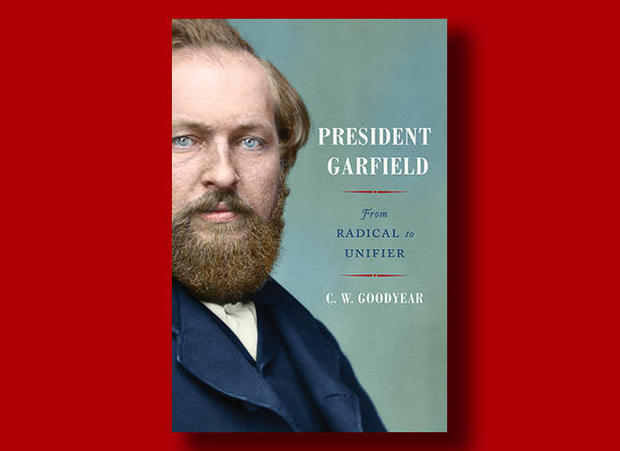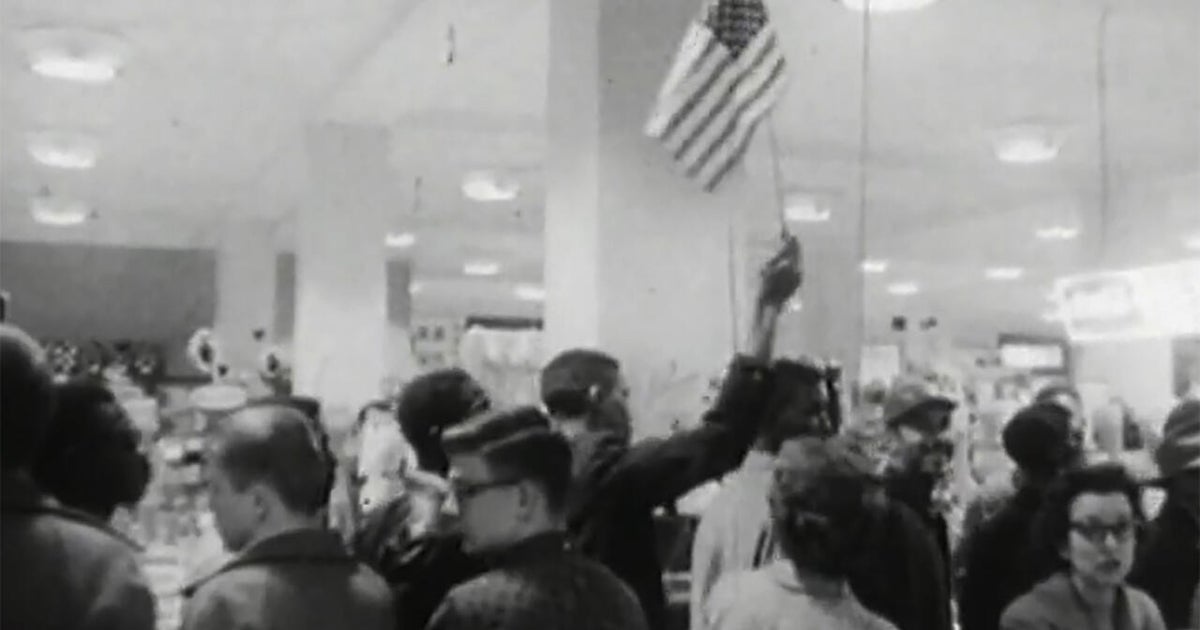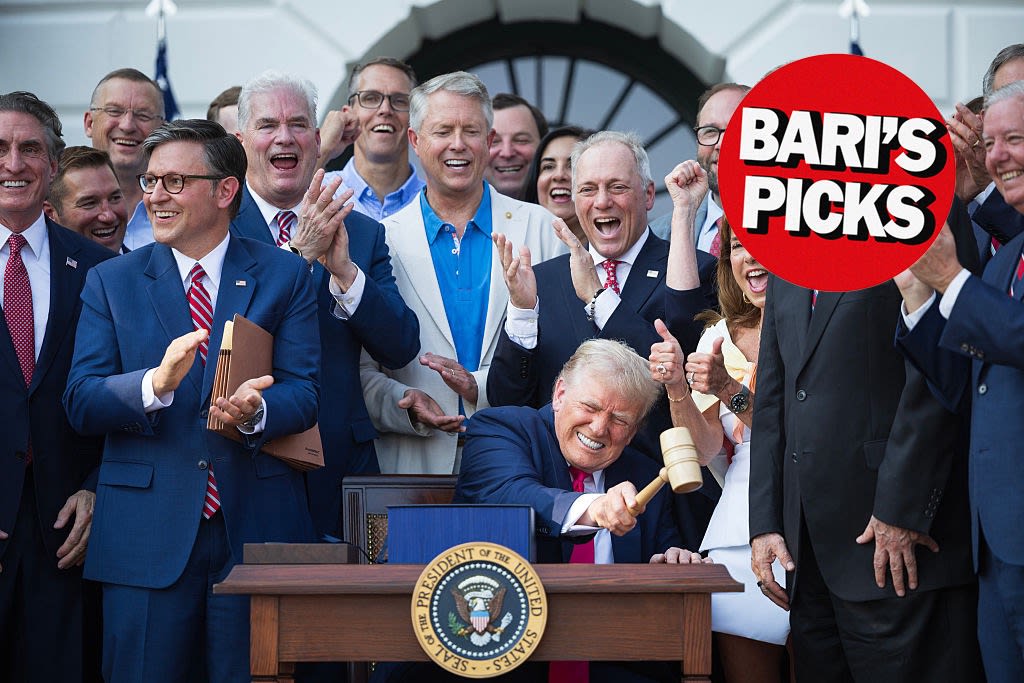Book excerpt: "President Garfield: From Radical to Unifier" by C.W. Goodyear
We may receive an affiliate commission from anything you buy from this article.
C.W. Goodyear's "President Garfield: From Radical to Unifier" (Simon & Schuster, a division of Paramount Global) is a sweeping biography of the 20th president, that illuminates the life of a remarkable Civil War general and politician and his surprisingly consequential influence on the United States, before his assassination in 1881.
Read an excerpt below.
"President Garfield: From Radical to Unifier" by C.W. Goodyear
Prefer to listen? Audible has a 30-day free trial available right now.
Rain drums Chicago's gridded streets on the early morning of June 9, 1880. Decorations sag and calcium lights hiss; warm, glowing lobbies lure celebrants inside as the night air is washed of the tang of fireworks. Then peace rules the city, with only newfangled electric lampposts—exuding soft light and a soothingly industrial thrum—left holding out against the black and the quiet.
This brief calm falters before dawn, when a murmuring crowd packs the entrance of the Grand Pacific Hotel on Jackson Street. A band soon arrives to beat out patriotic tunes—thereby spoiling an ambush: the
weather is unseasonably dismal, the hour unreasonably early, but hundreds have defied both to escort the new Republican nominee for president on his journey home.
His attempt at escape fails almost immediately. At eight-thirty, a distinctively large head (two feet in circumference) is seen bobbing under a side-exit, and the mob catches up to it within a half-block. Thus overtaken, James Garfield can only politely surrender to popular will. His hat lifts to reveal a kindly smile. Eyes like summer lightning invite the people to come along, if they'd like.
They do, in a human tide—its noise, the pumping lyrics of "See, The Conquering Hero Comes" and less rhythmic swells of cheers. The candidate at its center has been buffeted by thousands of congratulations in the last eighteen hours.
Upon finally reaching a train station, Garfield climbs onto a car festooned with flags. He shelters within until nine o'clock sharp—a time that is marked by engines firing, wheels chugging, and the car's back door creaking open. Then, as a witness recorded:
"Gen. Garfield yielded to popular demand and appeared on the rear platform, where he was greeted with a succession of cheers from a thousand pairs of patriotic lungs."
His outline recedes into the rain, leaving behind a depot of soggy supporters who are exultant despite the weather and their wetness. Their happiness had been well-stoked since yesterday, when Garfield yielded to a far more pressing demand from a larger audience. "I am not a candidate, and I cannot be," he had repeatedly told a convention packed with senators and generals, governors and congressmen.
Editors now opine the Republican Party (so dreadfully divided) had little choice but to force Garfield to accept the nomination for president anyway. "He was so aggressive, and yet so conciliatory."
Under bluer skies and across a nation now stretching unbroken from Atlantic to Pacific, millions of citizens learn the rough, remarkable outlines of a life driven by those traits. James Garfield's story had begun in a setting so rudimentary as to be alien to most Americans in this mechanized age: a one-room log cabin on the Ohio frontier.
Erudite readers would describe his reported upbringing as almost Dickensian. Garfield's father (indistinguishable "from the other plodding farmers" of early Ohio) had not survived their harsh surroundings for long—leaving his widow and four children to fend for themselves on a lonely homestead. "Mrs. Garfield ... managed to support herself and the family on the little farm left by her husband, and James, from his earliest years, was obliged to aid ... in the general work about his home," describes one northeastern outlet. "James had a tough life of it as a boy," another in Illinois summarizes.
Other columnists take pains to specify the toils of the nominee's childhood. Early years splitting firewood, plowing, and working a carpenter's bench had ended when he ran away for the Twainish exploit of piloting a canal boat. But brawls and a bout of malaria evidently set the teenager straight: Garfield enrolled in nearby schools—paying for one by working as its janitor. Readers from Manhattan, New York, to Manhattan, Kansas, peek over their papers to tell their children to never complain again.
Then, a climb that packs enough color to defy the black-and-white of print. The canal boy is baptized; he emerges as a tall, sandy-haired teacher, caning students in a firelit winter classroom; he roams summer roads as a lay preacher; an almond-eyed student passes by, catching his attention; he turns twenty-six and is a married college president—idolized by hundreds of farmers' children flocking for instruction; he is a state senator, swapping peacetime political capital for a wartime army uniform; he is raring to fight as civil war engulfs America, telling voters a "government actually based on the monstrous injustice of human slavery" must not be allowed to exist; he leads congregants and students up frigid Kentucky slopes to hunt rebels; a general's stars bloom on his shoulders—the youngest to bear them in the U.S. Army; he crusades into the Deep South, sheltering runaway slaves in camp against orders; he becomes the second-youngest congressman in America at thirty-one and one of its most progressive. Then seventeen years fly by in a paragraph, and he is minority leader of the House—an unassuming, unparalleled survivor of an age's worth of legislative battles.
—
Many of Garfield's political triumphs are lost to readers in that acceleration. He had been the youngest participant in America's radical revolution and remains perhaps the last still politically alive; he had chaired committees governing the country's military, budget, census, and currency; he had trimmed many millions in federal spending; he had singlehandedly investigated a president, swindled an Indian tribe out of its ancestral lands, and even established a new wing of government: the first Department of Education. ("Shall we enlarge the boundaries of citizenship, and make no provision to increase the intelligence of the citizen?" he'd dared Congress during that particular fight.)
His speeches on these topics and more, as later compiled by a colleague, would be found to "present an invaluable compendium of the political history of the most important era through which the National Government has ever passed."
Garfield has also seemingly found time for impressive activities outside the Capitol. Republicans as varied as William McKinley, James Blaine, and Benjamin Harrison court his stump services. Statesmen jaded by a lifetime of sappy speeches have reported their cynicism cured by a single Garfield performance. "It was eloquent, but it was far more than that;" one would write with wonder:
"It was honestly argumentative; there was no sophistry of any sort; every subject was taken up fairly ... indeed, every person present, even if greenbacker or demagogue, must have said within himself, 'This man is a friend arguing with friends; he makes me his friend, and now speaks to me as such.'"
Reports of the new nominee's other extracurriculars dazzle other observers. Garfield is multilingual—and ashamed to have let his German, in particular, get rusty recently. He has built a legal career in parallel with his political one, only to see it also reach incredible heights: attorney Garfield has won cases before the Supreme Court. Whenever time allows, he also writes articles for The Atlantic and The North American Review. His most recent editorial in the latter had run the year before—insisting, against rebuttal, that it had not been a mistake to grant Black Americans the vote, and that ongoing attempts to suppress that right only amounted to national self-sabotage:
"Such a conflict will not only retard the advancement of the negro and delay the restoration of national harmony, but it will inflict immeasurable injury upon the social and business prosperity of the South ... Reviewing the elements of the larger problem, I do not doubt that [Black] enfranchisement will, in the long run, greatly promote the intellectual, moral, and industrial welfare of the negro race in America; and, instead of imperiling the safety of our institutions, will remove from them the greatest danger which has ever threatened them."
An even more exceptional piece from Garfield's pen ran in the New England Journal of Education a few years earlier; an original proof of the Pythagorean theorem. The editors had attached a note verifying Garfield's work, calling it "something on which the members of both houses can unite without distinction of Party."
As Garfield's train clips out of Illinois, Democrat reporters use less flattering episodes of his long career to paint him as the epitome of a Washingtonian swamp creature. ("He is the most corrupt man in America!" an ex-cabinet secretary thunders.) Reprinted in graver tones is the allegation that Garfield helped rig the previous presidential election, before brokering an era-ending compromise to paper the crime over:
"Hayes could plead that he did not steal the Presidency. He was the fence ... Garfield was one of the principal robbers."
Yet other Democrats cannot help but add to their opponent's resume. "I look upon him as the ablest Republican on the legislative floors of Washington," one confesses to a reporter. Others compliment Garfield's possession of that rarest of political qualities—genuine friendliness to everyone, no matter their party or the issue at hand: "He was so generous an opponent, so warm and free and liberal in his relations to his political foes."
It was, all told, an impossible record to succinctly review. "Such an accumulation of honors had never before fallen upon an American citizen," a senator would later say of Garfield's resume.
The sitting president agrees—even ranking Garfield's name highest in the national pantheon. "The truth is no man ever started so low who accomplished so much in all our history," Rutherford B. Hayes scribbles in the White House. "Not [Benjamin] Franklin or [Abraham] Lincoln even."
From "President Garfield: From Radical to Unifier" by C.W. Goodyear. Copyright © 2023 by C.W. Goodyear. Reprinted by permission of Simon & Schuster, Inc. All Rights Reserved.
Get the book here:
"President Garfield: From Radical to Unifier" by C.W. Goodyear
Buy locally from Bookshop.org
For more info:
- "President Garfield: From Radical to Unifier" by C.W. Goodyear (Simon & Schuster), in Hardcover, eBook and Audio formats
- cwgoodyearbooks.com
See also:
- How doctors killed President Garfield ("Sunday Morning")






